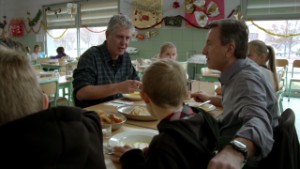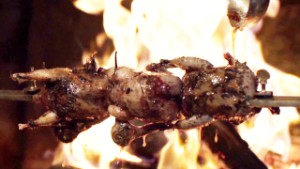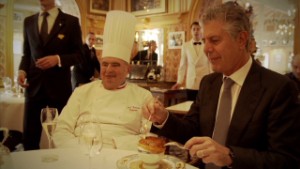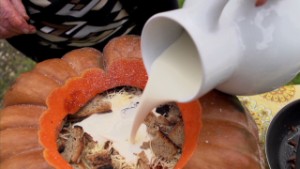Lions of Lyon
This Sunday, we take a trip back to childhood with one of America's greatest chefs, Daniel Boulud , to look at one of the most important figures in his life and career, Paul Bocuse -- and at the system, the place and the culture of food that raised both of them.
Where do great chefs come from?
They do not emerge, fully formed, in crisp Egyptian cotton whites, towering toques, an imperious attitude, into their dining rooms. In France, in and around Lyon, where this episode of "Anthony Bourdain Parts Unknown" takes place, a region famous for its food, chances are they were farm boys, the children of fathers already in the industry, the working poor. They were survivors of "the System," products of a very old, entrenched military-style hierarchy which relied on methods which we would now rightly call abuse.
Re-live Season 3! Check out the "Parts Unknown" live blog
Back in the day -- the years that my guide, the great chef Daniel Boulud peeled his first carrot -- you started early. Daniel's childhood was dedicated to work on the family farm: milking cows, working the fields. Childhood ended for him, as it did for many chefs of that generation, at age 14, when he went to work in professional kitchens.
Things were harder then.
Demanding a 12-16 hour work day of cooks was common practice. As was manhandling them. Slapping -- even beating a cook was not unheard of, nor necessarily frowned upon. And if you worked with the best -- as Daniel did, as a young Paul Bocuse did, as they all did, who rose through the French system to become what for a lack of a better word, we have come to call "celebrity chefs," the pressure -- night after night, day after day, year after year, was enormous.
Every chef I've ever spoken to has one mentor who inhabits their dreams, who remains, years later, their personal nightmare. There is always someone whose disappointed or angry face , appearing in a dream, causes successful, world famous chefs to, decades later, sit bolt upright in bed from a dead sleep, mouth open in mute terror, certain they've left something in the oven, messed up a sauce, forgotten an instruction -- somehow drawn the wrath of "Chef."
For Eric Ripert, I suspect, it's Joel Robuchon, who still visits him at night. For Gordon Ramsay? Marco Pierre White, looming over him again and again, crawling inside his head, driving him to tears.
I asked the "Lion of Lyon", Paul Bocuse, perhaps the most famous and respected chef of the last 100 years, a man now in his 80's, if there was someone in his past, some mentor of long ago, who still disturbed his dreams.
"La Mere Brazier," he responded without having to reflect for a second.
When tracking it all back -- the recipes, the traditions, the structure, behaviors, the genealogy of haute cuisine, when we look at the sleek, fine dining rooms of the so-called 1% we love to loathe, and we look back at where those techniques, those presentations, the combinations of ingredients came from -- we find, largely, a group of women in Lyon between the wars, called "Les Meres." Most famously, the fearsome Mere Brazier. These were women cooks who moved out of the houses of the rich to fill the vacuum left by males departing for the war. They opened restaurants, bouchons and bistros across Lyon, adapted dishes created for their previous clients -- along with the best of what they'd grown up with -- refined them to satisfy the demands of a very discerning public. Searching the mostly male kitchens of modern Lyon for where it all came from, the roots of what became, in the 60's and 70's, "la Nouvelle Cuisine," -- we found again and again that all roads seemed to lead back to them.
La Mere Brazier, was, by the way, not just the first woman to be awarded three Michelin Stars -- but the first chef -- period -- to hold six (between two restaurants).
Times were often very tough in France. Many of the principles of the grand kitchens came directly from the imperatives of survival on the farm: "Use Everything." "Waste Nothing." These are dictums familiar to any culinary student today.
So, what we're talking about, when we look back for the source of all this "frippery" and "frou-frou," the luxuries and excesses of fine dining, we find, much of the time, dishes whose inspiration began with a broke-ass farmer trying to figure out how to feed his family from a single bony rooster, and generations of abused, overworked, underpaid children -- none of whom were allowed, much less able to afford to eat -- ever -- in their own dining rooms.
So, if you look at Daniel Boulud, who now runs some of the greatest restaurants in the country (and beyond), and you think you see a guy who lives in some aspirational fantasyland -- keep in mind, he had his teeth kicked in every day for three decades or so before getting here.
When you see the simple looking preparation of Salmon in Sorrel sauce in the kitchen of les frères Troisgros, try and understand that what you are seeing changed the way all of us now order and eat our fish today, that it marked a tectonic shift as important to the craft of cooking as the invention of the electric guitar to music.
Lastly, when looking at where it all comes from, know that it comes from a culture where food is, simply put, important, because it is important.
In the episode, we go back to Daniel's primary school, where, for a fraction of what we spend in this country to feed our kids horrifying, processed slop, kids get to eat a healthy, delicious and relatively adventurous meal. Eating well, in France, as in Italy, Spain, most of Asia, much of Latin America, is a point of pride, an expression of identity, a birthright. Whether it's simply a bowl of beans or a bony fish grilled over wood, its preparation is worth talking about, it's worth arguing about passionately.
Our newfound American obsession with all things food and chefs may veer frequently into the silly zone -- but we are, in our own awkward way, lurching towards what others have had for centuries: a basic understanding that food -- good food -- is a fundamental, hugely important part of life well lived, at whatever income bracket.
When I was a young cook, getting my ass kicked on a regular basis, or bouncing from one never-gonna-happen kitchen to another, I owned a treasured copy of Paul Bocuse's "La Cuisine de Marche." I'd stare for hours at a time at the photos of dishes like Truffle Soup Elysee en croute, Lievre a la Royale, his incredible whole fish in pastry, trying to figure out how, how anyone could make such beautiful things. Struggling through the recipes with my rudimentary French skills didn't help much in solving the mystery or lessening the wonder. The dishes remained, for all my life, unapproachable -- a lost ideal; legendary creations of another time that I, sadly, would never see.
On this episode, I finally got to see them. Better yet, to eat all of them, the Greatest Hits of the Glorious career of Paul Bocuse -- while he sat next to me.
It was an amazing, unexpected, never dreamed of, late-in-life windfall -- like a lifelong Yankee fan somehow finding himself throwing the ball around the backyard with Joe DiMaggio. ❚
- Share This







